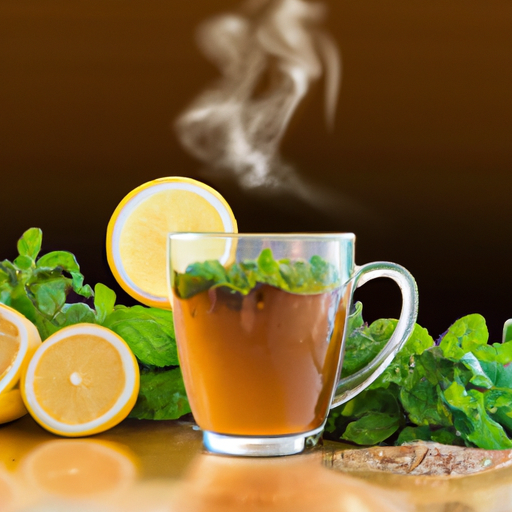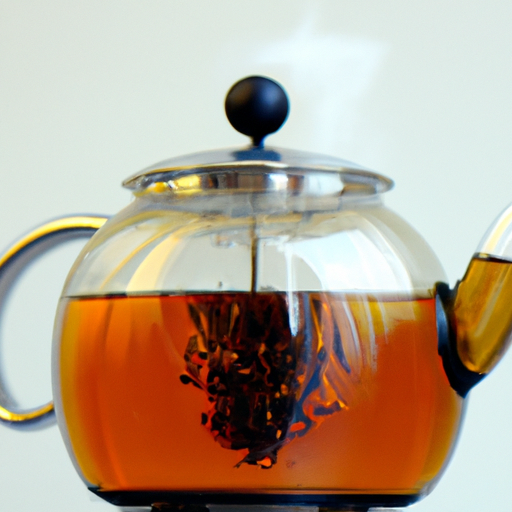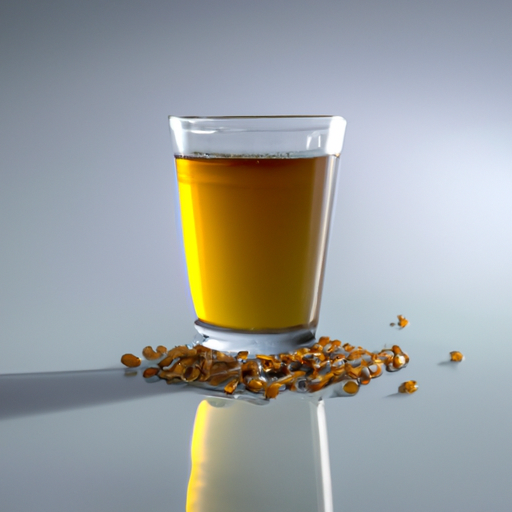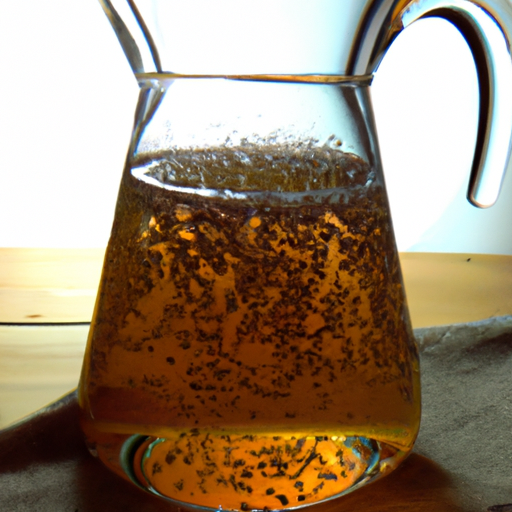As an enthusiast of discovering various beverages, I recently came across barley tea, a drink that has a long history of consumption in certain regions globally. Despite its potentially uninviting name, the health advantages that this tea offers are significant enough to warrant attention.
In this article, I’ll be discussing what barley tea is good for based on the latest scientific research. Let me start by saying that barley tea has a reputation for being a mild, refreshing drink that can be enjoyed hot or cold. It is often consumed in East Asian countries such as Japan and Korea, where it is known as mugicha and boricha, respectively.
While it is not as popular in the western world, barley tea has been gaining recognition for its potential health benefits. So, let’s dive into what makes this tea so special.
Key Takeaways
- Barley tea is a caffeine-free, low-calorie drink that is rich in antioxidants, vitamins, and minerals, making it a great addition to an overall healthy lifestyle.
- It has natural diuretic properties, aids in hydration, and can improve sports performance, making it a great choice for athletes.
- Barley tea has anti-inflammatory effects, helps regulate pH balance in the stomach, and has prebiotic fibers that promote good bacteria growth, aiding in digestion and reducing inflammation.
- Regular consumption of barley tea can reduce the risk of certain diseases such as inflammatory bowel disease and colorectal cancer, as well as improve skin health by fighting against free radicals and stimulating collagen production.
Overview of Barley Tea
Barley tea’s got a lot going for it – let’s start with an overview of this delicious drink! Barley tea is a caffeine-free, low-calorie drink made by brewing roasted barley grains in hot water. It is a popular beverage in Asian countries, especially during the summer months.
The barley tea brewing process involves roasting the barley grains until they turn brown and then steeping them in hot water for a few minutes. There are different types of barley tea flavors, depending on the roasting process and the barley variety used. Some barley teas have a nutty, toasty flavor, while others have a sweet, caramel-like taste.
Some types of barley tea are blended with other ingredients such as corn, chicory, or green tea to enhance their flavor and aroma. Barley tea is a great thirst quencher and has several health benefits. It is rich in antioxidants, vitamins, and minerals that help boost immunity, aid digestion, and promote overall well-being.
Barley tea is also a natural diuretic, which means it helps flush out toxins from the body and reduces bloating. So, if you’re looking for a healthy and refreshing drink that’s low in calories and high in nutrients, barley tea is the way to go!
Hydration Benefits
Apparently, it’s not like you need to drink water to stay hydrated anyways. While water is the most essential liquid to consume for hydration, there are other beverages out there that can help with this, and barley tea is one of them. In fact, barley tea is known to have hydration benefits that can help improve sports performance and even cure hangovers.
To understand how barley tea can aid in hydration, let’s take a look at the following table:
| Nutrient | Amount per 100g | % Daily Value |
|---|---|---|
| Water | 99.7g | – |
| Sodium | 2mg | 0.1% |
| Potassium | 27mg | 1% |
As you can see, barley tea is almost entirely made up of water, with a whopping 99.7% per 100g. This means that drinking barley tea can help quench your thirst and rehydrate your body after a workout or a night of drinking. Additionally, the small amounts of sodium and potassium found in barley tea can help replenish electrolytes lost during physical activity or alcohol consumption.
Overall, drinking barley tea can be a great way to stay hydrated and improve sports performance. Additionally, its hydrating properties can even make it a helpful hangover cure. However, it’s important to note that while barley tea can aid in hydration, it should not replace water as the primary source of hydration. With that being said, let’s move on to the next section to explore the digestive benefits of barley tea.
Digestive Benefits
I love drinking barley tea because it has several digestive benefits that help me feel better throughout the day.
One of the main advantages of drinking barley tea is that it soothes upset stomachs.
It also promotes healthy gut bacteria, which is essential for maintaining a healthy digestive system.
Soothes upset stomachs
You’ll love how soothing barley tea can be for your upset stomach. If you’re dealing with nausea or indigestion, barley tea can offer some much-needed relief. Here are some reasons why:
-
Barley tea is a natural antacid, meaning it can neutralize the acid in your stomach that’s causing discomfort.
-
The tea contains compounds that have anti-inflammatory effects, which can reduce inflammation in your digestive tract.
-
Drinking barley tea can help regulate the pH balance in your stomach, which can prevent heartburn and acid reflux.
-
The tea also contains prebiotics, which can feed the beneficial bacteria in your gut and improve overall digestive health.
-
Finally, barley tea is caffeine-free, so you don’t have to worry about it making your upset stomach worse.
So if you’re looking for a natural way to soothe your upset stomach, reach for a cup of barley tea. Not only will it help alleviate your symptoms, but it can also promote healthy gut bacteria, which we’ll discuss in the next section.
Promotes healthy gut bacteria
Boosting the growth of beneficial bacteria in your gut is crucial for maintaining gut health and balancing the microbiome. Barley tea is a great option to achieve this goal since it contains prebiotic fibers that help promote the growth of good bacteria, such as lactobacilli and bifidobacteria.
In fact, a study published in the Journal of Agricultural and Food Chemistry found that barley tea increased the population of lactobacilli and bifidobacteria in the gut of mice. These beneficial bacteria are known to aid in digestion, improve immune function, and reduce inflammation. Additionally, consuming prebiotic fibers may also help to reduce the risk of certain diseases, such as inflammatory bowel disease and colorectal cancer. Incorporating barley tea into your diet may be a simple and tasty way to support your gut health and microbiome balance. Speaking of which, let’s now highlight how barley tea’s anti-inflammatory properties can also contribute to your overall health.
Anti-Inflammatory Properties
Feeling achy and inflamed? Barley tea might just be the soothing remedy your body needs to ease any discomfort.
Barley tea has been found to possess anti-inflammatory properties that can help alleviate the symptoms of arthritis and other inflammatory conditions. A study published in the Journal of Medicinal Food showed that the consumption of barley tea significantly reduced inflammation markers in the body.
Barley tea contains certain compounds that are known to have anti-inflammatory effects. For instance, lignans, which are phytochemicals found in barley, have been found to have potent anti-inflammatory properties. Additionally, the presence of antioxidants like phenolic acids and flavonoids in barley tea also contribute to its anti-inflammatory effects. These compounds work by reducing oxidative stress and inflammation in the body.
Apart from its anti-inflammatory effects, barley tea is also known to possess antioxidant properties. These antioxidants help protect the body against free radicals, which are harmful molecules that can damage cells and contribute to the development of chronic diseases. By consuming barley tea regularly, you can boost your body’s natural defense system and reduce your risk of developing diseases like cancer, diabetes, and heart disease.
Barley tea is a delicious and nutritious beverage that offers a range of health benefits. Its anti-inflammatory and antioxidant properties make it an excellent choice for anyone looking to soothe inflammation and protect their body against disease. So, if you’re looking for a natural way to improve your health, consider incorporating barley tea into your diet.
Antioxidant Properties
As you sip on this golden elixir, your body is being shielded from harmful free radicals and safeguarded against chronic diseases by the powerful antioxidants found in each delicious cup. Barley tea is a rich source of antioxidants, which are compounds that protect the body from damage caused by free radicals. Free radicals are unstable molecules that can cause damage to cells and contribute to the development of chronic diseases such as cancer, heart disease, and Alzheimer’s disease. By neutralizing free radicals, antioxidants help prevent cellular damage and reduce the risk of chronic diseases.
The antioxidants in barley tea come from various sources, including phenolic compounds, flavonoids, and lignans. These compounds are found in the grain and husk of barley, and are released when the tea is brewed. The table below provides a breakdown of the various sources of antioxidants in barley tea and their role in disease prevention:
| Source of Antioxidants | Role in Disease Prevention |
|---|---|
| Phenolic Compounds | Anti-inflammatory, Anti-cancer |
| Flavonoids | Cardiovascular health, Anti-cancer |
| Lignans | Hormonal balance, Anti-cancer |
Research has shown that diets rich in antioxidants can help prevent chronic diseases such as cancer, heart disease, and diabetes. In addition, antioxidants can also improve immune function and reduce inflammation in the body. By incorporating barley tea into your diet, you can increase your intake of these important compounds and help protect your body against disease.
As we move into the next section about potential cancer prevention, it is important to note that while antioxidants have been shown to have anti-cancer properties, they should not be relied upon as the sole method of cancer prevention. However, incorporating foods and drinks rich in antioxidants, such as barley tea, into a healthy and balanced diet can be a beneficial step towards reducing the risk of chronic diseases.
Potential Cancer Prevention
One potential benefit of regularly drinking barley tea is its ability to prevent the development of cancer. Studies have shown that the antioxidants present in barley tea may help to reduce the risk of cancer by preventing the formation of free radicals in the body. Free radicals are unstable molecules that can damage cells and DNA, leading to the development of cancer.
By drinking barley tea regularly, we can increase our antioxidant intake and help to prevent the development of cancer. In addition to its cancer-preventative properties, barley tea has also been used for its medicinal benefits. Traditional Chinese medicine has used barley tea to help improve digestion and relieve stomach ailments.
Barley tea has also been shown to have anti-inflammatory properties, which can be helpful in treating conditions such as arthritis and other inflammatory diseases. Overall, drinking barley tea on a regular basis can have numerous health benefits, including cancer prevention and medicinal uses.
In the next section, we will discuss the cardiovascular benefits of barley tea and how it can help to improve heart health.
Cardiovascular Benefits
You’re in luck if you have a soft spot for your heart- drinking barley tea regularly is a great way to keep your ticker in tip-top shape, and it’s like hitting two birds with one stone.
Not only is barley tea a refreshing beverage, it also has preventive effects on cardiovascular health. Here are five reasons why barley tea is good for your heart:
-
Barley tea contains compounds that help reduce LDL cholesterol levels, which is often referred to as the ‘bad’ cholesterol. High levels of LDL cholesterol can increase the risk of heart disease and stroke.
-
The antioxidants in barley tea help protect your heart from oxidative stress. Oxidative stress can damage cells, including those in your heart.
-
Drinking barley tea can help lower blood pressure, which is a major risk factor for heart disease. Studies have shown that regularly drinking barley tea can help regulate blood pressure levels.
Incorporating barley tea into your diet can be a simple yet effective way to maintain cardiovascular health. While it’s not a cure-all, it can certainly be a helpful addition to an overall healthy lifestyle.
Moving forward, let’s explore how barley tea can also aid in weight management.
Weight Management
I find it interesting to explore the potential benefits of barley tea for weight management.
According to research, barley tea is low in calories and can be a great alternative to high-calorie beverages.
Additionally, some studies suggest that barley tea may aid in weight loss due to its ability to regulate blood sugar levels and reduce appetite.
Low in calories
If you’re looking for a refreshing drink that won’t weigh you down, barley tea is a great choice as it’s low in calories. This healthy hydration option is perfect for those who want to quench their thirst without consuming too many calories.
In fact, a cup of barley tea only contains around 2-4 calories, making it an excellent low calorie beverage option. Drinking low calorie beverages like barley tea can have many benefits.
Here are some reasons why you might want to consider incorporating barley tea into your daily routine:
- It can help with weight management by providing a low calorie alternative to sugary drinks.
- It can help you stay hydrated without adding unnecessary calories to your diet.
Now, let’s take a closer look at how barley tea may aid in weight loss.
May aid in weight loss
As I mentioned earlier, barley tea is low in calories, making it a great option for those looking to watch their weight. But did you know that it may also aid in weight loss?
According to a study published in the Journal of Nutritional Science and Vitaminology, drinking barley tea may increase calorie burning and boost metabolism. This is due to the presence of antioxidants and other compounds in barley that have been found to have these effects. In addition to being a low-calorie beverage, barley tea may also have the added benefit of helping you shed some extra pounds.
By increasing calorie burning and boosting metabolism, it can potentially aid in weight loss efforts. So, if you’re looking for a natural and delicious way to support your weight loss goals, consider incorporating barley tea into your diet.
Moving on to the next topic, let’s explore the skin health benefits of barley tea.
Skin Health Benefits
I’ve been drinking barley tea for a while now and I’ve noticed some positive changes in my skin. It turns out that barley tea may improve skin health, thanks to its antioxidant properties.
Additionally, this tea is high in minerals and vitamins that can support healthy skin, such as selenium, magnesium, and vitamin B.
May improve skin health
Barley tea can be great for your skin because it contains antioxidants that can help fight against free radicals and protect your skin from damage caused by environmental factors. These antioxidants can also stimulate collagen production, which is essential for maintaining youthful and healthy-looking skin. Collagen is a protein that helps keep your skin firm and elastic, but as we age, our body produces less of it.
By incorporating barley tea into your diet, you may be able to boost your collagen levels and prevent signs of aging. Furthermore, barley tea is a refreshing and hydrating alternative to sugary drinks that can contribute to skin problems like acne and inflammation. Staying hydrated is essential for maintaining healthy skin, and drinking barley tea can help you achieve this while also providing other skin health benefits.
With its abundance of antioxidants and potential collagen-boosting properties, barley tea can be a simple yet effective addition to your skincare routine. Next, let’s explore how barley tea is high in minerals and vitamins that can benefit your overall health.
High in minerals and vitamins
You’ll be pleased to know that barley tea is one of the top sources of essential minerals and vitamins that your body needs. This beverage is rich in calcium, magnesium, iron, potassium, and phosphorus, which are all vital for maintaining healthy bones, muscles, and organs.
Barley tea is also packed with vitamins B1, B2, and B3, which play a crucial role in converting food into energy and boosting your immune system. Drinking barley tea regularly can help you meet your daily dietary requirements for these essential nutrients.
Calcium, for instance, is necessary for strong bones and teeth, while magnesium is crucial for regulating blood pressure and maintaining a healthy heart. Iron is essential for carrying oxygen throughout the body, and potassium helps to regulate fluid balance and muscle function.
By incorporating barley tea into your diet, you can ensure that your body is getting the nutrients it needs to function at its best.
Frequently Asked Questions
What is the best way to brew barley tea?
When it comes to brewing barley tea, there are several techniques to choose from. One popular method is to boil the barley in water for around 10 minutes before letting it steep for an additional 5-10 minutes.
Another option is to use a tea infuser and steep the barley in hot water for 5-10 minutes. Flavor variations can be achieved by adding different herbs or sweeteners to the tea.
Some people enjoy adding honey or lemon for a sweet and tangy flavor, while others prefer a more earthy taste by using ginger or mint. Ultimately, the best brewing technique and flavor variation is a matter of personal preference.
Can barley tea be consumed by individuals with gluten sensitivities or allergies?
Gluten-free alternatives to barley tea are available for individuals with gluten sensitivities or allergies. Although barley tea is a natural source of antioxidants and has benefits for digestion, it contains gluten, which can cause adverse reactions in some people. However, there are various gluten-free alternatives to barley tea, such as chamomile, peppermint, or ginger tea, that can provide similar benefits for digestion and overall health.
It’s always important to consult with a healthcare provider if you have any concerns about consuming barley tea or any other food or beverage that may contain gluten. As they say, "an ounce of prevention is worth a pound of cure."
How does barley tea compare to other types of teas in terms of caffeine content?
When comparing caffeine content, barley tea has less caffeine than green tea. A cup of barley tea typically contains around 0-6 mg of caffeine, while a cup of green tea contains around 35-70 mg of caffeine.
However, when comparing brewing techniques, barley tea is similar to black tea in that it’s often steeped for a longer period of time and can be brewed with hotter water.
It’s important to keep in mind that the caffeine content can vary depending on the specific type and brand of tea, as well as the brewing method and serving size.
Overall, if you’re looking for a low-caffeine alternative to green tea, barley tea may be a good option to consider.
Are there any potential side effects or risks associated with drinking barley tea?
I was curious about the potential risks of drinking barley tea, so I did some research. While barley tea is generally considered safe for most people, there are a few potential risks to be aware of.
First, some people may be allergic to barley or other grains, so if you have a history of allergies, it’s important to be cautious when trying barley tea for the first time.
Additionally, barley contains gluten, so people with celiac disease or gluten intolerance should avoid barley tea or opt for a gluten-free version.
It’s also worth noting that barley tea may interact with certain medications, so if you’re taking any prescription drugs, it’s best to consult with your doctor before drinking barley tea regularly.
Overall, while there are some potential risks associated with drinking barley tea, they are relatively minor and can usually be avoided with proper precautions.
Can barley tea be used as a natural remedy for any specific health conditions or ailments?
When it comes to barley tea benefits, traditional uses have often involved aiding in digestion. This is because barley contains insoluble fiber, which helps to promote regular bowel movements and prevent constipation.
Additionally, barley tea has been shown to have anti-inflammatory properties, which may help to reduce inflammation in the digestive tract.
While more research is needed to fully understand the potential health benefits of barley tea, it’s clear that it can be a beneficial addition to a healthy diet and lifestyle.
Conclusion
In conclusion, I’ve become a fan of barley tea after researching its various health benefits. Not only does it hydrate, but it also aids digestion and has anti-inflammatory properties for overall health. Additionally, it has antioxidants and potential cancer prevention benefits.
Barley tea is a great choice for those seeking cardiovascular benefits and weight management. It also has benefits for skin health. Overall, I highly recommend incorporating barley tea into your daily routine. As the saying goes, "An apple a day keeps the doctor away,"but perhaps we should add "a cup of barley tea a day keeps the ailments at bay."










